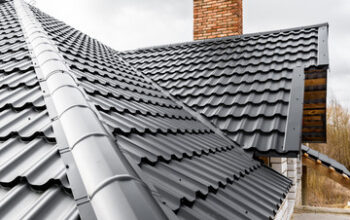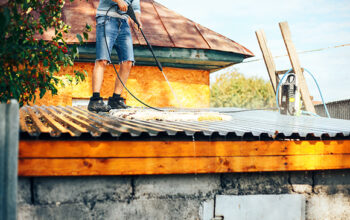When it comes to roof repair and maintenance, it is important to remember that there are several different types of shingles to choose from. These include built-up roofing, pre-cast concrete, slate, and wood shingles. All of these materials are incredibly durable and are designed to stand up to the weather.
Built-up roofing is a flat roof system that consists of several layers of membrane, tar, and gravel. These materials work together to form a protective shield against the elements. This type of roofing has been used for more than a century, and it continues to evolve.
A built-up roof is ideal for low-slope buildings. Its high-reflectivity top layer helps keep the surface cooler, which reduces energy bills. When a built-up roof is installed properly, it can last for up to 40 years. The system is also fire-resistant.
The membrane is made up of a base sheet, a fiber sheet, and one or two layers of bitumen. In some cases, a UV-reflective coating is applied on the top layer to increase its reflectivity. Some roofs have a mineral-surfaced SBS membrane underneath the aggregate.
The membrane is applied with hot or cold bitumen and is mechanically attached to the decking. Felts are then placed on top of the base and fiber sheets to add insulation. Plastic cap roofing nails are used to secure the seams.
Built-up roofs can be installed over any type of commercial roof deck. Using the right contractor can help prevent problems and ensure a long lifespan. With proper care, built-up roofing can also be used as a platform for solar energy systems.
Built-up roofing systems offer excellent grip and resistance to heavy weather. They are also easy to install. They are a reliable solution for both residential and commercial buildings.
Wood shingles for roofing are a beautiful, natural addition to your home. They add depth and elegance to your house, and they are durable and environmentally friendly.
Unlike asphalt shingles, wooden shingles are able to withstand extreme impacts and remain stable for decades. However, they require regular maintenance and repairs. To avoid leaks and damages, it is advisable to hire a professional contractor.
The wood you use for your shingle roof should be of good quality and dimensionally stable. It should also be light in weight. In terms of durability, it should be resistant to insects and UV rays.
When choosing wood for your roof, be sure to select the heartwood of redwood. This material is abrasion resistant and resistant to moss. Also, choose lumber that has an even grain for ease of manufacture.
Depending on your needs, you can buy a variety of styles, sizes, and colors. Some examples include straight, tapered, and diamond shingles. Typically, they are 18 inches to 24 inches wide.
You can also purchase different thicknesses. Five shingles, for example, are 16 inches long and are 1/4 inch thick at their thin end. Another type of shingle is the re-butted and re-jointed shingle, which are more uniform in their shape.
Choosing the right kind of wood for your shingle roof depends on many factors. First, you should consider the climate in your area. If it is raining or snowing often, you should make sure you have a solid underlayer to prevent leaks. Second, you should look for a local source of wood. Lastly, it is important to find a contractor with a lifetime warranty.
Spray Polyurethane Foam roofing is a spray-applied, monolithic membrane system that forms a highly flexible, impact-resistant, and dimensionally stable single layer that is suitable for use in all climates. SPF roofing systems are ideal for commercial and industrial roofing applications. They are extremely cost-effective, long-lasting, and provide exceptional resistance to wind uplift. The system is also extremely environmentally friendly, providing superior insulation and protecting the building from harmful events.
Rigid asphaltic foam is manufactured by combining polyols and asphaltic components in a pre-reaction mixture. A uniform product is formed by covalently bonding the components to the polyurethane polymer.
Asphaltic foam is a relatively lightweight material that can be used for structural applications. The compressive strength and rigidity of the final product can be increased by increasing the density of the foam. It is also acceptable to blend soft asphalts with polyols at low temperatures.


